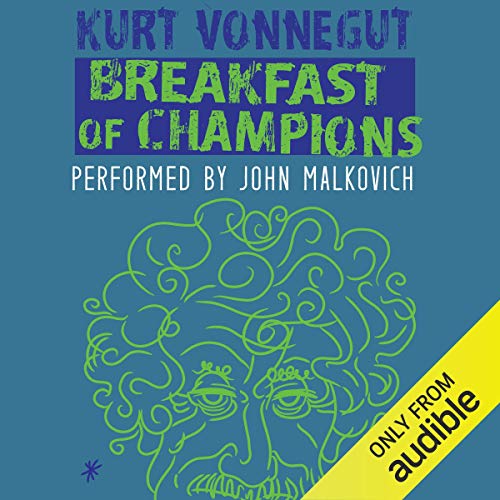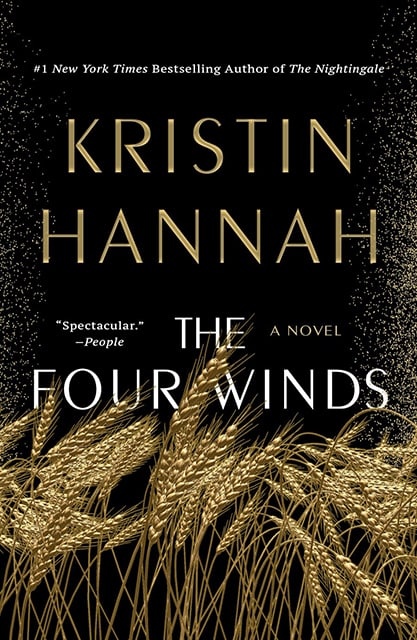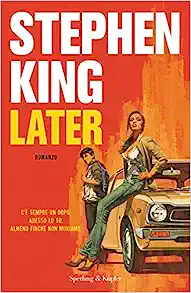“Breakfast of Champions” by Kurt Vonnegut is like diving into a wild and wacky world where everything seems just a little off-kilter, but in the most fascinating way possible.
It was published in 1973 by Delacorte Press. It came at a time when Vonnegut was already an established literary figure, having previously published notable works such as “Slaughterhouse-Five” and “Cat’s Cradle.” The novel typically spans around 300 pages, though the exact count may vary depending on the edition and formatting.

So, settle in and get ready to be entertained and enlightened by this unparalleled masterpiece of literature!
What Is Kurt Vonnegut Breakfast of Champions About?
“Breakfast of Champions” tells the story of two main characters: Kilgore Trout, a struggling science fiction writer, and Dwayne Hoover, a wealthy businessman but unstable car dealer. He becomes obsessed with Trout’s work, which leads to his mental breakdown.
Meanwhile, Trout receives an invitation from the town’s arts festival to attend as a guest, where Dwayne lives. The plot kicks off when Dwayne Hoover reads one of Trout’s bizarre and satirical novels, which triggers a mental breakdown. He becomes convinced that everyone around him is a robot, controlled by a conspiracy to ruin his life. Dwayne sets off on a bizarre rampage. So, basically, everything gets really crazy.
Key turning points include this Dwayne’s descent into madness, culminating in a violent confrontation with Trout, and Trout’s realization of the impact his writing has on others. Through these events, Vonnegut prompts readers to question the nature of reality and the role of the individual in shaping it.
As the story unfolds, Vonnegut uses his trademark blend of satire and dark humor to explore themes such as free will, identity, and the power of storytelling. He uses satire and humor to critique American society, particularly its obsession with consumerism and materialism.
Overall, “Breakfast of Champions” is a thought-provoking and satirical exploration of the human condition, told through the lens of two eccentric characters whose lives intersect in unexpected ways.
In the end, Vonnegut leaves us with the message that while life may be absurd and unpredictable, there is still beauty to be found in the connections we make with one another and the stories we tell.
What Is The Theme of The Breakfast of Champions?
“Breakfast of Champions” explores several themes, but one central theme is the absurdity of human existence and the struggle to find meaning in a seemingly chaotic world. Vonnegut uses satire and dark humor to depict a society driven by consumerism, materialism, and superficiality, where individuals often feel lost and disconnected from genuine human connection. Through the characters of Kilgore Trout, an obscure science fiction writer, and Dwayne Hoover, a mentally unstable car dealer, Vonnegut delves into the complexities of identity, free will, and the search for purpose.
One point the book makes is the idea that humans are often trapped in cycles of destructive behavior, unable to break free from societal norms and expectations. This is illustrated through the characters’ repetitive patterns of thought and action, which ultimately lead to chaos and destruction. Vonnegut suggests that true liberation comes from questioning and challenging these norms, rather than blindly conforming to them.
Another aspect of the theme is the exploration of the power of perception and how it shapes our reality. Dwayne Hoover’s descent into madness is triggered by a chance encounter with Kilgore Trout’s writing, which he interprets as a revelation about the nature of existence. This highlights the fragility of the human mind and the dangerous consequences of unchecked beliefs and perceptions.
Moreover, Vonnegut critiques the dehumanizing effects of modern society, where individuals are reduced to mere consumers and commodities. Characters like Kilgore Trout, who live on the fringes of society, serve as a reminder of the importance of authenticity and creative expression in a world obsessed with conformity and uniformity.
Ultimately, “Breakfast of Champions” serves as a poignant commentary on the human condition, urging readers to question the absurdities of life and to seek meaning and connection in a world that often seems indifferent to their existence. Through its darkly comedic narrative and thought-provoking themes, the novel challenges readers to confront their own perceptions and assumptions about reality, inviting them to embark on a journey of self-discovery and introspection.
Why Is It Called Breakfast of Champions?
Well, Vonnegut is playing with us, like a cheeky chef in a fancy restaurant who decides to serve up something unexpected. You see, “Breakfast of Champions” is a phrase often used to describe a super nutritious and hearty breakfast, the kind that’ll give you the strength and energy to take on the day. But in Vonnegut’s world, it’s not about eggs and bacon; it’s about waking up to the absurdity of life itself. Vonnegut uses the title to poke fun at how companies sell their products to us. He’s saying, “Hey, being a champion isn’t about what you eat for breakfast!” Instead, he wants us to think about the weirdness of life and how we make choices.
Vonnegut’s title is a clever way of showing how commercial slogans can influence our thinking. Originally the phrase “Breakfast of Champions” used to be a slogan for a cereal called Wheaties by Kellogg Company. Vonnegut takes this slogan and turns it around to show how silly it is. He’s saying, “Hey, being a champion isn’t about what you eat for breakfast!” By using this slogan ironically, he highlights the absurdity of consumer culture. He wants us to question the messages we’re bombarded with every day and think for ourselves.
The title also reflects Vonnegut’s larger themes of individual freedom and the power of choice. He suggests that true champions are those who make their own decisions and don’t just follow the crowd. So, “Breakfast of Champions” isn’t just a funny title—it’s a reminder to look beyond the surface and think critically about the world around us.
In summary, “Breakfast of Champions” serves as a clever entry point into Vonnegut’s exploration of themes such as consumerism, free will, and the nature of storytelling. The title name symbolizes the idea that individuals have the power to shape their own destinies and make meaningful choices, even in a world that may seem chaotic and absurd.
Characters List of Breakfast of Champions
“Breakfast of Champions” is featuring a diverse cast of characters. Each character in “Breakfast of Champions” contributes to the novel’s exploration of themes such as free will, identity, and the nature of reality. Let’s know about each one and see how they contribute to the story:
Kilgore Trout: He’s an unsuccessful and obscure science fiction writer, who becomes a central figure in the story. His appearance at a literary festival sets off a chain of events in the lives of other characters.
Dwayne Hoover: A wealthy and mentally unstable car dealership owner. He becomes obsessed with Trout’s writing after reading one of his books, which triggers a mental breakdown.
Kilgore Trout’s characters: While not individual characters per se, Trout’s creations from his science fiction stories play a significant role. They often serve as metaphors for societal issues and human nature.
Mildred Hoover: Dwayne’s wife, who is portrayed as a passive and somewhat indifferent character. She’s caught in the middle of Dwayne’s breakdown.
Fred T. Barry: A fictional version of Vonnegut himself, who appears as the narrator of the story. He interacts with various characters and provides insights into the narrative.
Kilgore Trout’s admirers: These are characters who attend the literary festival and admire Trout’s work. They play a role in introducing Trout’s ideas to Dwayne Hoover.
Dwayne Hoover’s employees: Various employees of Dwayne’s car dealership, who witness his unraveling and try to make sense of his erratic behavior.
Kilgore Trout’s publishers and critics: They represent the literary establishment and provide commentary on the nature of art, creativity, and commercial success.
Various minor characters: Including patrons of Dwayne’s car dealership, attendees of the literary festival, and residents of the town where the story is set. They add depth to the narrative and reflect different aspects of society.
Final Words
To unlock all the secrets of “Breakfast of Champions,” you’ve got to read the book. It’s like peeling back layers of a really weird onion. From crazy characters to mind-bending moments, Kurt Vonnegut Jr.’s story is a rollercoaster ride through the bizarre. It’s a book that will challenge your assumptions, tickle your funny bone, and leave you hungry for more. So go ahead, take a bite – you won’t regret it.So, if you want to untangle the whole wacky tale and discover its hidden treasures, grab a copy and get ready for a journey you won’t forget!



Pingback: Is Breakfast of Champions Worth the Read - Books in Brain